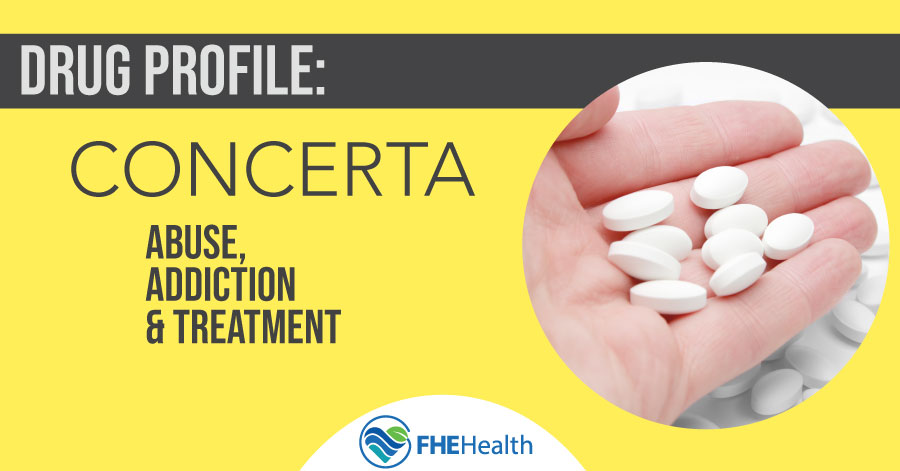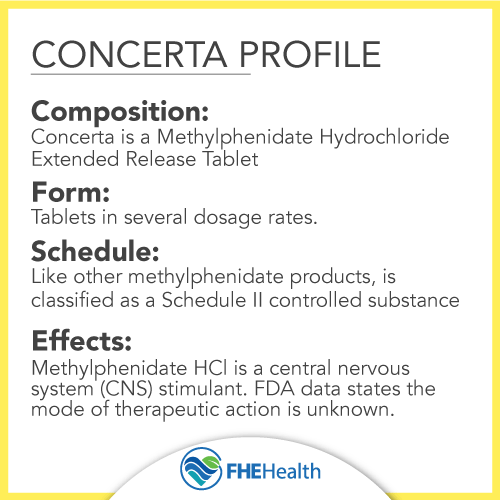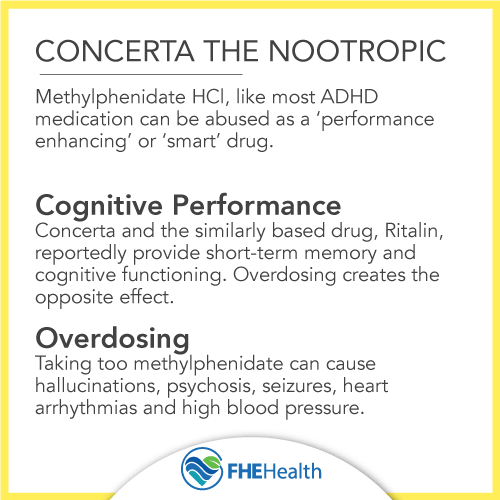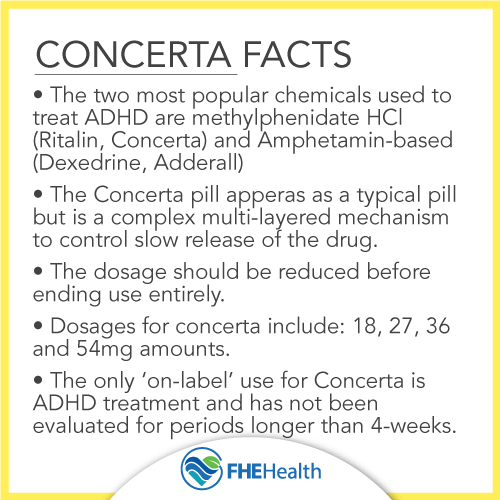
According to the Centers for Disease Control and Prevention, around 11% of U.S. children aged 3 to 17 years receive a diagnosis of attention deficit hyperactivity disorder at some point in their lives. Many adults are also seeking ADHD diagnoses as they learn more about this condition and self-identify with some of its symptoms. For people aged 6 and over, CONCERTA® can be helpful in managing symptoms. However, like other ADHD drugs, CONCERTA poses risks of abuse and addiction.
This guide discusses CONCERTA as a treatment medication and its potential for abuse. It also provides information about seeking treatment for CONCERTA abuse and addiction.
What Is CONCERTA?
Once-a-day CONCERTA is often prescribed to treat ADHD. The drug helps control chemicals in the brain associated with hyperactivity and impulsive behavior. CONCERTA is a relatively new drug in this space, having been on the market since 2000.
While CONCERTA is a helpful medication for people who need it, it’s also associated with prescription drug abuse and ADHD medication addiction.
Introduction to Concerta

Long-acting CONCERTA is the brand name for methylphenidate, which is only available in extended-release form. It has the same active ingredient as some other stimulants used to treat ADHD, such as Ritalin.
CONCERTA is a Schedule II drug, meaning it’s accepted for medical use but can be abused and has some history of leading to dependence. The drug’s time-release formulation is designed to promote a steady level of medication in an individual’s body. When taken properly, a dose of CONCERTA should stay in a person’s system for 12 hours, where it works to curb impulsivity and enhance focus. CONCERTA should never be taken without a doctor’s prescription.
CONCERTA doesn’t work the same for everyone. Some people may feel its effects within an hour; others may need more time for the medication to reach therapeutic levels. Unlike short-acting stimulants that can spike and crash, CONCERTA is intended to create smoother results throughout the day.
Even though CONCERTA is long-lasting, it’s not designed to cover a full 24-hour period, and patients may need adjustments if symptoms return later in the evening.
Identifying Concerta
Concerta is prescribed in pill form. The pills are cylindrical and appear more like a pellet than a normal, rounded pill. They come in different colors according to their potency, including yellow (18 mg), gray (27 mg), white (36 mg) and red (54 mg).
CONCERTA also has a unique outer coating that the body can’t digest. Patients may notice what looks like a whole pill in their stool, which can be alarming if they aren’t told in advance. This is normal, however, since the outer shell is just the delivery system. The body absorbs the active drug before the shell is excreted.
The drug is associated with various slang terms for “study drugs,” such as smarties, skittles, kiddy cocaine, kiddie coke and kibbles and bits. People who abuse CONCERTA may take the pill improperly. Since the pill is designed to be a slow-release tablet, crushing it or mixing it with another substance delivers a different effect than intended. The potential for overdosing on methylphenidate HCl is greatly increased in these cases.
When is Concerta Used?

Physicians typically prescribe CONCERTA for ADHD, but it’s sometimes prescribed to treat narcolepsy. CONCERTa has become a popular option for ADHD treatment because it lasts longer in the person’s system than other drugs that treat the condition, such as Adderall.
People who take CONCERTA should experience improvement in their ability to focus. Unfortunately, side effects can occur. People who take CONCERTA may experience difficulty sleeping, a decrease in appetite, stomachaches, nausea, weight loss and headaches.
Some patients report rebound effects as the medication wears off. Symptoms of ADHD or mood swings can briefly return or intensify once the drug leaves a person’s system. Doctors often manage this by adjusting the timing of doses, changing the dosage amount or pairing CONCERTA with behavioral therapies to help manage transitions between medicated and unmedicated periods.
It’s important to tell your physician about any side effects you’ve experienced and if they persist. Also, if the drug stops working as well as it once did, let your doctor know. In serious cases, a person taking CONCERTA could experience complications that might include hallucinations and delusions.
CONCERTA can also interact with other medications, particularly antidepressants, blood pressure medications and certain seizure drugs. A complete medical history and full disclosure of all supplements or medications are essential before beginning treatment.
CONCERTA vs. Other ADHD Medications
CONCERTA isn’t the only — or the oldest — option available for treating ADHD symptoms. Other options include:
- Adderall
- Vyvanse
- Ritalin
The main differences between all these medications, including CONCERTA, are how long they last in the system, how quickly they take effect and how individuals tolerate them. Adderall tends to take effect more quickly than other options, for example, while CONCERTA smooths symptom relief with a slow release. Vyvanse metabolizes in a way that increases the duration of impact, and Ritalin’s impact depends on the type prescribed.
Because every person responds differently to ADHD medications, doctors often adjust medication type and dosage as they work closely with patients to find a balance that best controls symptoms while reducing side effects and risks of chemical dependency.
Concerta and Addiction
CONCERTA is associated with a risk for abuse and addiction. Its active ingredient intensifies levels of dopamine and norepinephrine in the central nervous system. Activating these brain chemicals causes pleasant, feel-good effects.
Taking more of the drug than prescribed or taking it before the next scheduled dose are forms of abuse that can lead to addiction. People under a doctor’s care can still become addicted to CONCERTA, which is why it’s important to tell your doctor if it begins to work less effectively than before. This could be a sign you’ve developed a tolerance for the drug. Rather than increasing the dose, some physicians may opt for a different drug to treat the condition.
Taking CONCERTA without a prescription is a form of drug abuse. People who get the drug from someone else or buy it on the street are at risk for overdose. Because the drug is slow-acting, people sometimes take additional doses, thinking the amount taken isn’t working. They may also combine it with other drugs without realizing the possible interactions. This is dangerous, as CONCERTA can be fatal if you take too much.
How Does Concerta Addiction Happen?
In adults, CONCERTA binds to receptors in the brain that would also activate to process cocaine. A person can become addicted to a drug like CONCERTA when their body and mind become dependent on it. By increasing the dose of CONCERTA, a person can develop a tolerance to it, requiring higher amounts to achieve the same effects. This practice paves the path to addiction.
What Are the Dangers of Abusing Concerta?
When taken at low doses, CONCERTA does what it’s meant to do: treat ADHD. However, when taken in high doses by someone who routinely or habitually abuses the drug, CONCERTA can cause serious health problems such as:
- Heart attack
- Stroke
- Liver damage
- Kidney damage
- Stomach damage
- Tremors
- Seizures
- Cognitive problems
- Development of tics
- Depression
- Delusional behaviors
Buying this drug on the street makes the dosage level uncertain, increasing your risk for overdose. Additionally, it’s not safe to take it with other drugs or alcohol.
Signs and Symptoms of Concerta Abuse/Addiction

People who abuse CONCERTA or have developed an addiction to it might exhibit the following signs and symptoms:
- Getting the drug from family members or friends
- Taking the drug in a manner that’s unprescribed (e.g., grinding up the pills and snorting them)
- Taking more than prescribed by a doctor
- Being unable to stop using the drug
- Using the drug for nonmedical reasons
- Beginning to withdraw from family or friends
- Failing to meet obligations at work or school
- Experiencing urges to take the drug
- Experiencing withdrawal symptoms when the drug isn’t taken
Treatment for Concerta Addiction
A person who’s addicted to CONCERTA can experience withdrawal symptoms if they don’t take the drug. CONCERTA withdrawal symptoms can include:
- Panic attacks
- Nausea
- Anxiety
- Irregular heartbeat
- Dysphoria
- Irritability
- Psychosis
- Headaches
- Fatigue
- Depression
People generally experience these symptoms after about 24 hours of stopping the drug’s use. Rather than stopping cold turkey, it’s best to seek treatment at a professional addiction treatment facility like FHE Health. Medical detox is typically the first step in addiction treatment.
Treating the Psychological Dependency
After medical detox, individuals begin receiving treatment for the mental and behavioral dependencies associated with CONCERTA addiction. For instance, an individual who became addicted to the drug because they believed it helped them perform better on tests or at work will need help overcoming this dependency. They’ll need guidance on managing their triggers to reduce the risks of relapse.
FHE Health offers comprehensive treatments for individuals who are addicted to CONCERTA. Through medical detox and behavioral health therapies, individuals can learn to manage their addiction and achieve long-term recovery.
Addiction is a chronic disease that’s often progressive. Without treatment, it’s likely to get worse. Contact FHE Health today to learn how we can help.






